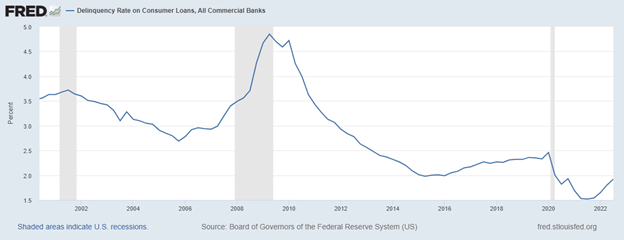Some are concerned about the state of U.S. consumer credit… Here’s why you shouldn’t worry about it! [Wednesdays: The Independent Investor]

Miles Everson’s Business Builder Daily speaks to the heart of what great marketers, business leaders, and other professionals need to succeed in advertising, communications, managing their investments, career strategy, and more.
A Note from Miles Everson:
Hello!
We’re excited to share another important insight in today’s “The Independent Investor.”
Every Wednesday, we publish articles about investing because we believe this activity can help us achieve true financial freedom.
Today, we’ll discuss what “experts” are missing about the state of U.S. consumer credit.
Read on to know why you shouldn’t worry about the current situation of customer debt in the U.S.
Miles Everson
CEO, MBO Partners
Chairman of the Advisory Board, The I Institute
The Independent Investor
The concept of credit actually dates back to at least 5,000 years.
While our forefathers didn’t have the small plastic cards we have today, they actually had their own means of recording credit.
How?
By inscribing records of transactions on stone tablets.
Archaeologists learned about this when they found artifacts from ancient Mesopotamian merchants. Based on their findings, stone tablets were used to record future agreements to pay for goods. With that, borrowing continued to evolve over time… until Frank McNamara, a businessman, changed everything with the first modern credit card.
Did you know the story behind the world’s first credit card is quite amusing?
In 1949, McNamara was dining with his peers at a restaurant in New York City. At the end of their meal, he realized he left his wallet at home. Luckily for him, his wife came over to the restaurant to bail him out and pay for the tab.
Embarrassed, McNamara wondered if there was a way for customers to make purchases on credit and then pay the bill at a later date.
This idea led him to found the Diners Club in 1950, a company that issued the “Diners Club Card” used to make purchases without using cash or check. In its first year alone, the club had over 40,000 members.

Photo courtesy of Diners Club
Since then, consumer credit cards have achieved widespread adoption.
—
Nowadays, using credit to purchase goods gives consumers financial flexibility and because of this, economies can grow at a faster pace.
Simply said, credit cards are great when used responsibly. Consumers who fail to do so are burdened with carrying balances and mounting interest expenses.
According to CreditCards.com, 60% of card debtors have carried their balances for more than a year, up from 50% in 2021. Some economists find this data alarming since consumer credit health is an important indicator of the strength of an economy.
Why?
It’s because a significant decline in consumer credit health could spell trouble. When this happens, the stock market could be negatively affected, leading to lower investor confidence and in some cases, panic selling.
This now brings us to an important question: Are the economists’ worries warranted?
One way to see if consumers are having trouble with credit is to look at delinquency rates. This number rises when people are unable to pay their balances and the amount of past-due debt increases.

Source: Federal Reserve Bank of St. Louis and the U.S. Federal Reserve
The chart above tells us that delinquency rates peaked in 2010 as consumers dealt with the negative effects of the Great Recession. Since then, the rates have dropped to below 2%, the lowest since before the 2008 financial crisis. This means consumers are able to maintain good credit standing for the most part.
Even though there is some concern about delinquency rates rising above 2% in 2023, it should be noted that this is still a historically low number.
—
Instead of worrying about consumer credit, you should look at other signals in tracking the current state of the stock market.
For starters, keep yourself updated about geopolitical events. More often than not, these developments will allow you to pinpoint the sectors of the economy that could be affected. Moreover, the sell-offs resulting in these developments will provide you with an opportunity to buy stocks at lower prices.
Additionally, take a look at the credit of the company you plan to invest in. Doing your research on this specific aspect of a firm’s operations will help you understand whether a specific stock is worth investing into or not.
As we’ve shown you above, there’s more than one way to examine the current situation of the stock market.
So, the next time you see a fellow investor worry about consumer credit, tell them about the other signals they could look at when examining stocks.
Happy mid-week, everyone!
(This article is from The Business Builder Daily, a newsletter by The I Institute in collaboration with MBO Partners.)
About The Dynamic Marketing Communiqué’s
“Wednesdays: The Independent Investor”
To best understand a firm, it makes sense to know its underlying earning power.
In two of the greatest books ever written on investing, the “Intelligent Investor” by Benjamin Graham and “Security Analysis” by David Dodd and Benjamin Graham (yes, Graham authored both of these books), the term “earning power” is mentioned hundreds of times.
LITERALLY.
Despite that, it’s surprising how earning power is mentioned seldomly in literature on business strategy. If the goal of a business is wealth creation, then the performance metrics must include the earning power concept.
Every Wednesday, we’ll publish investing tips and insights in accordance with the practices of some of the world’s greatest investors.
We make certain that these articles help you identify and separate the best companies from the worst, and develop your investing prowess in the long run.
Our goal?
To help you get on that path towards the greatest value creation in investing.
Hope you’ve found this week’s insights interesting and helpful.
Stay tuned for next Wednesday’s “The Independent Investor!”
Cheers,
Kyle Yu
Head of Marketing
Valens Dynamic Marketing Capabilities
Powered by Valens Research
www.valens-research.com




